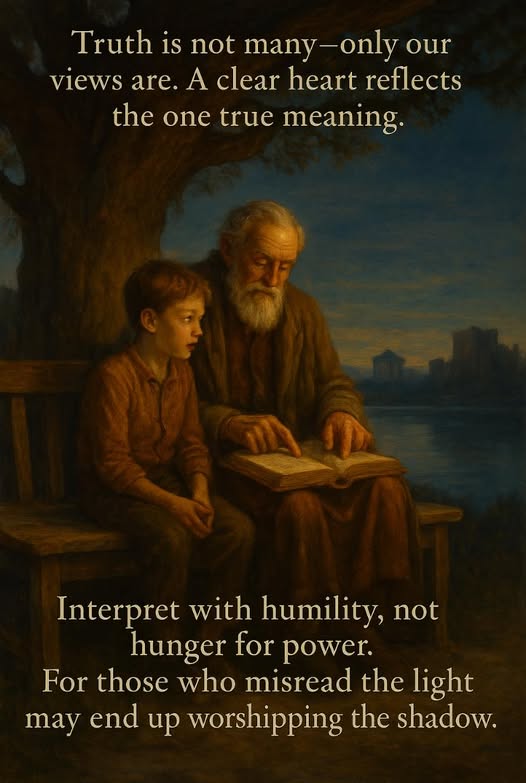
It was a cool morning after a night of spring rain, and Emil walked beside his grandfather along the edge of an overgrown path. They were headed to the old stone library at the edge of town, a place few visited anymore, its wisdom covered in dust.
“Grandfather,” Emil said, adjusting the straps of his backpack, “yesterday at school, my teacher wrote a sentence on the board: ‘Freedom requires obedience.’ Half the class said it meant we must obey to be free. The other half said it made no sense at all. Then everyone argued.”
His grandfather stopped near a fallen tree and turned to him. “Ah. The same sentence, two different storms. And what did you think it meant?”
“I didn’t know,” Emil admitted. “But it felt like… something important was buried in it.”
His grandfather nodded approvingly. “Then you were closest to the truth, because you listened before you judged.”
They walked a little farther before the old man continued.
“Every true statement has only one meaning, Emil. Like a treasure at the bottom of a still lake. But people throw stones of bias, anger, and pride into that lake—and all they see are ripples, never the truth beneath.”
He bent and picked up a clear, many-sided gem from a pouch. “Look at this.”
Emil took it, tilting it toward the morning light. “It sparkles in every direction.”
“Just like a powerful statement,” the grandfather said. “But remember: what sparkles isn’t always truth. Light bends. And people, instead of searching for the one true meaning, often grab the nearest glitter and claim it as law.”
They reached the library steps. Its stone arch had an inscription worn with age:
“To seek is noble. But to understand—this is wisdom.”
Inside, surrounded by faded scrolls and leather-bound books, his grandfather read aloud:
“Justice without mercy becomes cruelty.”
“What does it mean?” Emil asked.
His grandfather replied, “It means you cannot wield justice like a hammer without compassion. Otherwise, you become the tyrant you claimed to resist.”
Emil nodded. “Like when people punish others too harshly, thinking they’re defending something holy.”
His grandfather’s eyes sharpened. “Exactly. That brings us to something heavier, Emil—how sacred words are often misused.”
He unrolled a parchment containing a religious verse. It read:
“And judge between them by what God has revealed, and do not follow their vain desires.”
“Do you know what this verse means?”
Emil hesitated. “That we should follow what’s true… not what people want?”
“Good,” the grandfather said. “But here’s what happens when people take it out of context: Some believe this means they are now the judge, the executioner, the prophet, or even the architect of God’s will. They forget the backdrop. This verse came to a Prophet—not a politician—and to a man guided by divine revelation, not ego or nationalism.”
He paused. “That’s how some begin dreaming of reviving ancient empires—a khaleefa state, a Greater Israel, an Akhand Bharat—as if history’s symbols were blank checks to redraw borders with blood. They forget the rest of the verses. The mercy. The justice. The patience. The limits. The purpose of religion.”
“They forget,” the grandfather said quietly, “that playing God often begins with quoting God selectively.”
Emil frowned. “So they start building fences, claiming they’re building bridges.”
“Exactly,” his grandfather whispered. “They use holy words like blueprints, but build towers to themselves. They confuse divine purpose with personal ambition. And worse—they convince others that salvation lies in conquest and occupation, not character.”
Emil sat down near the window, thinking.
“Understanding is a garden,” his grandfather said. “Your mind is the soil. If it’s rocky with prejudice, no truth will grow there. But if it’s soft with humility, wisdom will bloom.”
“And if you misinterpret something?” Emil asked.
“You miss an open door,” his grandfather replied. “Every true interpretation opens a door to growth. A wrong one closes the door—and sometimes locks it with chains of hate.”
He placed the gem in Emil’s hand again. “Hold this. Think of it as your lens. Keep it clear. Wash it often—with humility, with study, and with prayer. Never use it to blind others. Only to help them see.”
They stepped outside into the warming day.
“Misunderstanding,” his grandfather said, “isn’t just a mistake. It’s a missed opportunity—and sometimes, a source of harm.”
Emil looked up at him. “And a clear heart… is like a calm lake that shows the sky as it really is.”
The old man smiled. “Yes. And when the sky is reflected clearly, you no longer worship the reflection… but walk toward the light itself.

